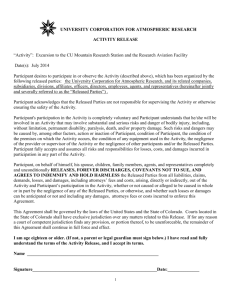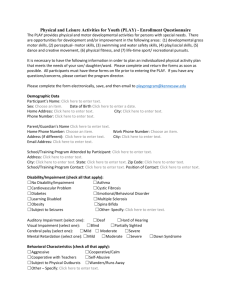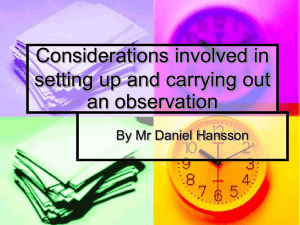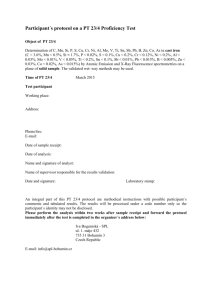The Stranger Socratic Seminar Worksheet
advertisement
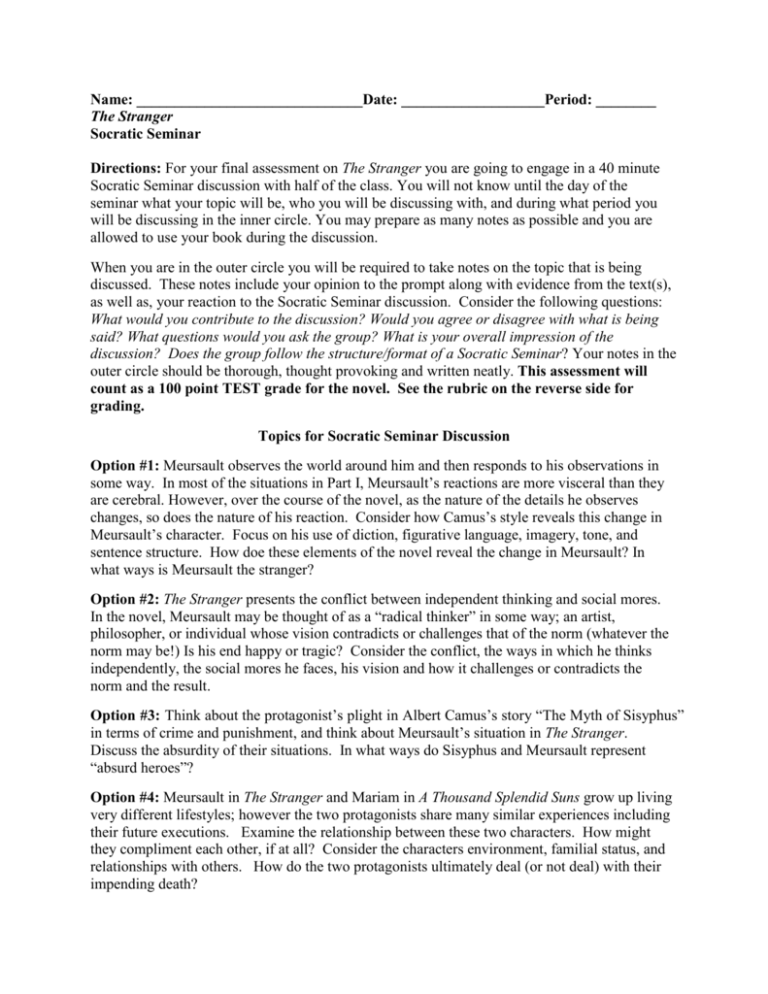
Name: ______________________________Date: ___________________Period: ________ The Stranger Socratic Seminar Directions: For your final assessment on The Stranger you are going to engage in a 40 minute Socratic Seminar discussion with half of the class. You will not know until the day of the seminar what your topic will be, who you will be discussing with, and during what period you will be discussing in the inner circle. You may prepare as many notes as possible and you are allowed to use your book during the discussion. When you are in the outer circle you will be required to take notes on the topic that is being discussed. These notes include your opinion to the prompt along with evidence from the text(s), as well as, your reaction to the Socratic Seminar discussion. Consider the following questions: What would you contribute to the discussion? Would you agree or disagree with what is being said? What questions would you ask the group? What is your overall impression of the discussion? Does the group follow the structure/format of a Socratic Seminar? Your notes in the outer circle should be thorough, thought provoking and written neatly. This assessment will count as a 100 point TEST grade for the novel. See the rubric on the reverse side for grading. Topics for Socratic Seminar Discussion Option #1: Meursault observes the world around him and then responds to his observations in some way. In most of the situations in Part I, Meursault’s reactions are more visceral than they are cerebral. However, over the course of the novel, as the nature of the details he observes changes, so does the nature of his reaction. Consider how Camus’s style reveals this change in Meursault’s character. Focus on his use of diction, figurative language, imagery, tone, and sentence structure. How doe these elements of the novel reveal the change in Meursault? In what ways is Meursault the stranger? Option #2: The Stranger presents the conflict between independent thinking and social mores. In the novel, Meursault may be thought of as a “radical thinker” in some way; an artist, philosopher, or individual whose vision contradicts or challenges that of the norm (whatever the norm may be!) Is his end happy or tragic? Consider the conflict, the ways in which he thinks independently, the social mores he faces, his vision and how it challenges or contradicts the norm and the result. Option #3: Think about the protagonist’s plight in Albert Camus’s story “The Myth of Sisyphus” in terms of crime and punishment, and think about Meursault’s situation in The Stranger. Discuss the absurdity of their situations. In what ways do Sisyphus and Meursault represent “absurd heroes”? Option #4: Meursault in The Stranger and Mariam in A Thousand Splendid Suns grow up living very different lifestyles; however the two protagonists share many similar experiences including their future executions. Examine the relationship between these two characters. How might they compliment each other, if at all? Consider the characters environment, familial status, and relationships with others. How do the two protagonists ultimately deal (or not deal) with their impending death? A Level Participant: Participant offers enough solid analysis, without prompting, to move the conversation forward. Through comments, demonstrates a deep knowledge of the text and question. Participant has come to the seminar prepared, with notes and marked/annotated texts. Participant, through comments, shows active listening to other participant. Participant offers clarification and/or follow-up that extends the conversation. Participant’s remarks often refer back to specific parts of the text. (72/75 points) B Level Participant: Participant offers solid analysis without prompting. Through comments, participant demonstrates a good knowledge of the text and the question. Participant has come to the seminar prepared, with notes and a marked/annotated text. Participant shows that he/she is actively listening to others and offers clarification and/or follow-up. (63/75 points) C Level Participant: Participant offers some analysis, but needs prompting from the seminar leader. Through comments, participant demonstrates a general knowledge of the text and question. Participant is less prepared, with few notes and no annotated text. Participant is actively listening to others, but does not offer clarification and/or follow-up to others’ comments. Participant relies more upon opinion, and less on the text to drive comments. (57/75 points) D Level Participant: Participant offers little commentary and comes to the seminar ill prepared with little understanding of the text and question. Participant does not listen to others, offers no commentary to further the discussion. He/she distracts the group by interrupting other speakers or by offering off topic questions and comments. Participant ignores the discussion and its participants. (50/75 points) F Level Participant Participant does not speak during the Socratic Seminar or comes ill prepared with no understanding of the text and question. (0/75 points) RUBRIC: Discussion: __________/75 points Outer Circle Notes: __________/25 points ____________________________________________ TOTAL: __________/100 points



